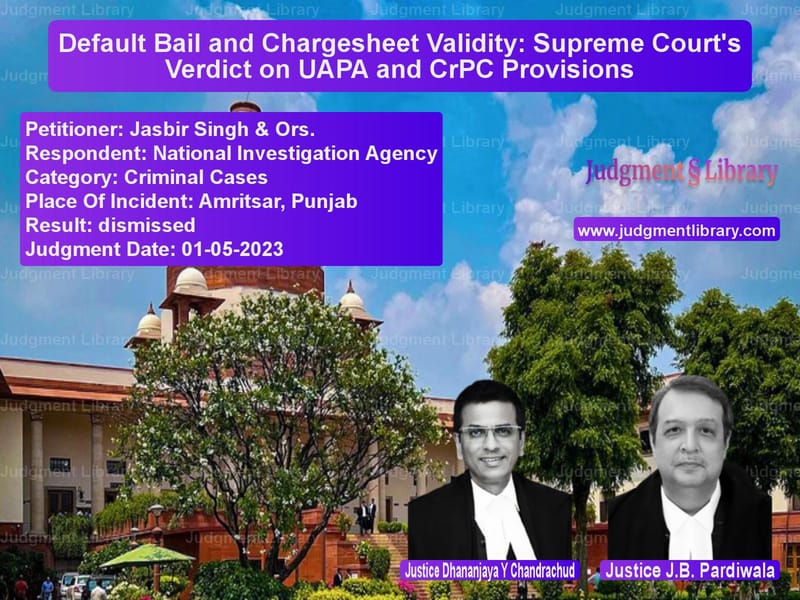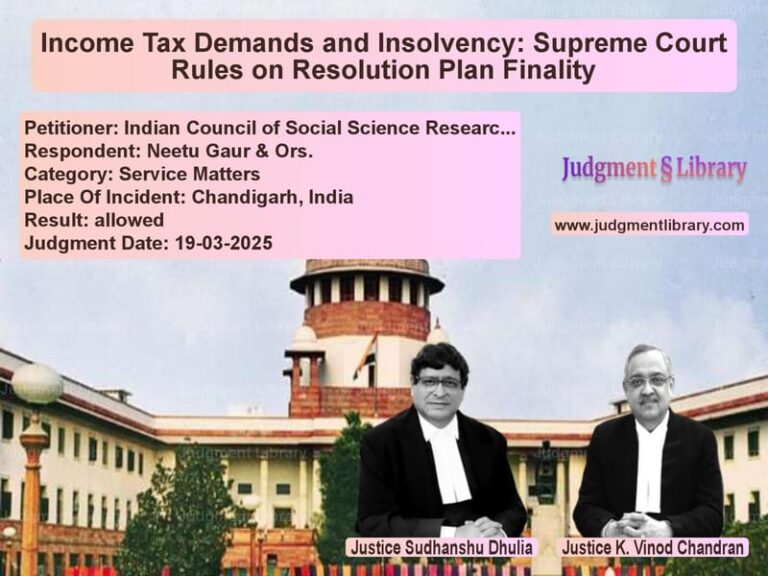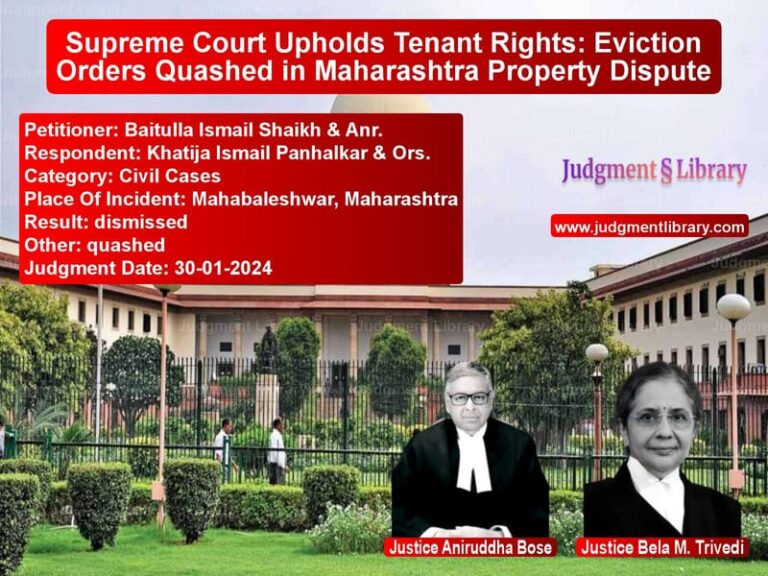Default Bail and Chargesheet Validity: Supreme Court’s Verdict on UAPA and CrPC Provisions
The Supreme Court of India, in the case of Jasbir Singh & Ors. vs. National Investigation Agency, addressed crucial legal questions regarding default bail under Section 167(2) of the Code of Criminal Procedure (CrPC) in cases where the chargesheet was filed without the requisite sanction under the Unlawful Activities (Prevention) Act, 1967 (UAPA). The Court examined whether a chargesheet filed within the statutory period, but lacking sanction, could prevent the accused from claiming default bail.
Background of the Case
The case arose from a police operation in Amritsar, Punjab, where two individuals were intercepted while traveling on a motorcycle without a number plate. Upon being stopped, they attempted to flee, leaving behind a bag containing hand grenades and a mobile phone. This led to the registration of FIR No. 90 under the Explosive Substances Act, 1908. Subsequently, sections of the UAPA were added, including Sections 17, 18, 18B, and 20, along with Section 120B of the Indian Penal Code (IPC).
Legal Issues Considered
The Supreme Court examined the following key legal issues:
- Whether an accused is entitled to default bail under Section 167(2) CrPC when the chargesheet is filed within the statutory time limit but lacks a valid sanction order.
- Whether cognizance of the chargesheet is necessary to prevent the accused from seeking default bail.
- Whether failure to obtain sanction before filing the chargesheet amounts to non-compliance with Section 167(2) CrPC.
- Whether filing the chargesheet in a Magistrate’s Court, instead of a Special Court under the NIA Act, renders subsequent proceedings invalid.
Petitioners’ Arguments
The accused, represented by Senior Counsel Colin Gonsalves, contended that:
- A chargesheet filed without sanction is incomplete and cannot be used to defeat an accused’s right to default bail.
- The grant of sanction is mandatory and should accompany the chargesheet to be considered a valid police report under Section 173(2) CrPC.
- The Special Court under the NIA Act had no jurisdiction to take cognizance of the chargesheet in the absence of sanction.
- The delay in obtaining sanction beyond the 180-day limit under UAPA was an abuse of process and violated Article 21 of the Constitution.
Respondent’s Arguments
The National Investigation Agency (NIA), represented by Additional Solicitor General Sanjay Jain, argued that:
- Default bail is only available if no chargesheet is filed within the statutory time period.
- A chargesheet without sanction is not incomplete but merely prevents the court from taking cognizance until sanction is granted.
- The sanction process is distinct from investigation and can be granted after the chargesheet is filed.
- Since the chargesheet was filed within 180 days, the accused had no indefeasible right to default bail.
Supreme Court’s Observations
Filing of Chargesheet and Default Bail
The Court held that a chargesheet filed within the statutory period, even without sanction, satisfies Section 167(2) CrPC. It ruled that default bail is granted only when no chargesheet is filed within the prescribed time, and the absence of sanction does not affect the validity of the chargesheet for this purpose.
Importance of Sanction
The Court clarified that the requirement of sanction under UAPA is necessary for taking cognizance, but not for filing a chargesheet. The grant of sanction is a post-investigation process, and a delay in obtaining it does not automatically entitle the accused to default bail.
Jurisdiction of Magistrate’s Court
The Court acknowledged that the chargesheet should have been filed directly in the Special Court under the NIA Act. However, it ruled that filing in a Magistrate’s Court and subsequent committal to the Sessions Court did not invalidate the proceedings, as the case was later transferred to the proper forum.
Final Judgment
The Supreme Court dismissed the appeals and ruled that:
- The filing of a chargesheet within 180 days prevents the accused from claiming default bail under Section 167(2) CrPC.
- Sanction under UAPA is required for taking cognizance but does not affect the validity of the chargesheet for default bail purposes.
- Procedural errors in filing the chargesheet before a Magistrate instead of a Special Court do not vitiate the trial.
- The accused may still challenge the validity of sanction during the trial, but they are not entitled to statutory bail on this ground.
Key Takeaways
- Clarification on Default Bail: Filing a chargesheet within the statutory time period, even if incomplete due to lack of sanction, is sufficient to deny default bail.
- Sanction and Cognizance: The requirement of sanction under UAPA applies at the stage of taking cognizance, not at the stage of filing the chargesheet.
- Role of Special Courts: While the chargesheet should be filed in the Special Court, procedural lapses do not automatically lead to acquittal or bail.
- Judicial Review of Sanction: Accused persons can challenge the validity of sanction during the trial but cannot use its absence to seek default bail.
Conclusion
The Supreme Court’s ruling sets a crucial precedent on default bail under Section 167(2) CrPC and the interplay between chargesheets and sanction under UAPA. It reaffirms that procedural irregularities do not automatically result in bail and underscores the importance of timely investigation and compliance with statutory provisions.
Petitioner Name: Jasbir Singh & Ors..Respondent Name: National Investigation Agency.Judgment By: Justice Dhananjaya Y Chandrachud, Justice J.B. Pardiwala.Place Of Incident: Amritsar, Punjab.Judgment Date: 01-05-2023.
Don’t miss out on the full details! Download the complete judgment in PDF format below and gain valuable insights instantly!
Download Judgment: jasbir-singh-&-ors.-vs-national-investigati-supreme-court-of-india-judgment-dated-01-05-2023.pdf
Directly Download Judgment: Directly download this Judgment
See all petitions in Bail and Anticipatory Bail
See all petitions in Terrorist Activities
See all petitions in Custodial Deaths and Police Misconduct
See all petitions in Judgment by Dhananjaya Y Chandrachud
See all petitions in Judgment by J.B. Pardiwala
See all petitions in dismissed
See all petitions in supreme court of India judgments May 2023
See all petitions in 2023 judgments
See all posts in Criminal Cases Category
See all allowed petitions in Criminal Cases Category
See all Dismissed petitions in Criminal Cases Category
See all partially allowed petitions in Criminal Cases Category







